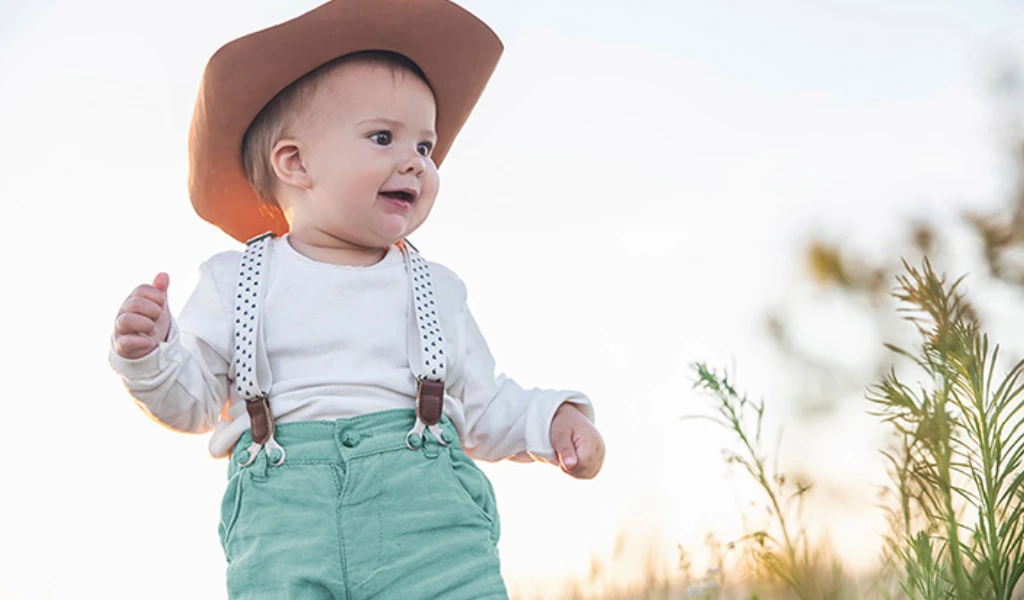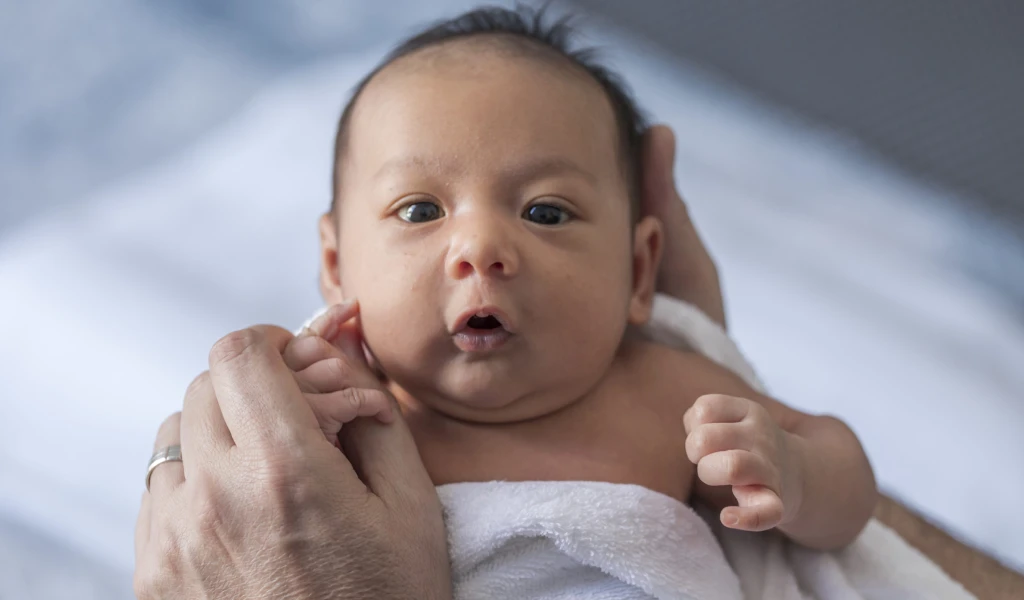Having a comprehensive guide outlining the expected symptoms for each week of pregnancy can assist you in staying informed.
During pregnancy, various changes occur. These changes are important for the health of you and your baby. Your body will gradually expand to accommodate your growing baby. It can be fascinating to track the development of your baby from conception to birth.
This article ‘Guide to Pregnancy Week by Week: Symptoms, Baby Development, and More’ will provide you with a week-by-week overview of pregnancy, documenting the incredible journey you are beginning.
Tracking the progress of your developing fetus: Monitoring the growth of your baby throughout each week of pregnancy
Below is a comprehensive examination of the progression of your developing fetus in your womb every week starting from the moment of conception.
1. The first month
During the initial month of pregnancy, the embryo consists of two layers of cells. These layers will eventually form the organs and body parts of the baby.
The 4th week
Below is the description of how your developing baby will progress during the fourth week of pregnancy, which marks the beginning of the first month of gestation.
- During the initial month of pregnancy, your developing fetus is a small embryo consisting of two layers of cells. These layers called the epiblast and the hypoblast, will eventually differentiate into the different organs and body structures.
- During this stage, the amniotic sac will begin preparing for its future role of protecting your baby. Throughout the pregnancy, your baby will remain enclosed within the amniotic sac.
- The cells in the early stage of your placenta will begin to burrow toward the walls of your uterus. This action will assist in expanding the space for blood flow. The blood will transport oxygen and essential nutrients to your developing baby in the following weeks.
- Your yolk sac will begin to produce red blood cells for your developing baby and assist in delivering nutrients. This process will continue until the placenta is fully functional and able to nourish the fetus.
The 5th week
Below is an overview of how your developing baby will progress during the fifth week of pregnancy:
- As you reach your fifth week, you will begin to observe an increase in the frequency and urgency of urination. This is due to the rise in renal blood flow and overall body fluid, resulting in added pressure on the bladder.
- Right now, your developing baby is the size of a sesame seed. Additionally, your fetus has progressed from having two layers of cells to now three, with each layer folded over the other.
- The neural tube is located on the outer layer of your developing baby’s cells. This structure is crucial for the development of the nerves, spinal cord, backbone, and brain of your baby.
- The villi, small blood vessels crucial in the formation of the early placenta, will now have the important task of supplying oxygen and essential nutrients to your developing fetus.
- At this point, the yolk sac is nearing the completion of its function in supplying nutrients to the developing placenta.
- Your developing fetus will now be enshrined in the amniotic sac and will be surrounded by an increasing amount of amniotic fluid throughout the pregnancy.
The 6th week
Below is the progression of development for your unborn baby during the sixth week of pregnancy, which falls within the first month of gestation:
- At six weeks into your pregnancy, your developing baby will have small hands that resemble paddles rather than fully formed hands. The fingers will be fused, but as the week progresses, your baby will begin to make small movements with its hands.
- Your infant will also possess small feet that resemble paddles rather than typical feet. The toes will remain connected to each other, and your baby will begin to move his feet by the end of the week.
- At this stage, your baby’s heart will beat rapidly, nearly twice as fast as your own heart. Additionally, the baby’s heart will begin to develop a distinct separation between the right and left chambers during this period.
- By the sixth week, your baby will begin to form their tongue and vocal cords.
The 7th week
This is how your developing baby will progress during the seventh week of your pregnancy, in the initial month of gestation.
- During the seventh week of gestation, the developing fetus will form eyelids that will partially cover the eyes.
- You will experience a heightened and more immediate urge to urinate compared to before. The volume of blood in your system is increasing steadily, exerting significant pressure on your bladder. Consequently, the excess fluid accumulated in your bladder will prompt a more frequent and urgent need to urinate.
- By the seventh week of pregnancy, your developing fetus will begin to form a tail-like structure, which is an extension of the tailbone. This structure will gradually disappear over the next few weeks.
- During this phase of development, the intestines of your developing fetus will begin to grow and take shape as a loop that will eventually develop into the umbilical cord.
2. The second month
In the second month of gestation, the fetus will be around the size of a kidney bean and will be more active compared to the first month. Additionally, by this time, the fetus will start developing distinct fingers with webbing between them.
The 8th week
- Throughout the current week, the nerve cells in your developing baby’s brain will begin to extend. As this branching out takes place, the nerve cells will then start to communicate with one another, creating the pathways of the primitive neural system.
- Your baby’s developing eyelids will be transparent and will largely shield the eyes.
- At this point in development, your fetus’s hands will be flexed at the wrist joint and positioned over the heart. The fingers will lengthen compared to the previous week, but will still have skin between them.
- At this point in pregnancy, your developing fetus will start to form knees and feet that are growing long enough to almost touch each other at the front of the body.
The 9th week
Here is the way your developing baby will progress during the ninth week of pregnancy, which is the second month.
- Around the ninth week of pregnancy or possibly a few weeks later, your healthcare provider might recommend undergoing a chorionic villus sampling (CVS) in specific circumstances. If this procedure is required, samples of cells will be collected from the tiny projections in the placenta known as the chorionic villi.
- During the ninth week of pregnancy, the fetus will form earlobes. At this stage, the baby’s eyelids will be closed and will remain shut until the 27th week of gestation.
- During this period of development, your fetus’s fingers will also grow slightly larger as their tactile pads begin to form.
- Your developing fetus will begin to move its limbs, and the major joints in the body will start functioning. At this stage of pregnancy, the shoulders, wrists, knees, elbows, and ankles will be mostly developed and operational.
The 10th week
Below is a description of the development of your unborn baby during the tenth week of your pregnancy, which falls in the second month.
- In the tenth week of pregnancy, your baby’s brain will begin to develop quickly, causing the forehead to protrude and be positioned high on the head.
- During this week, your baby’s fingers will no longer be connected by webbing but will be fully separated as distinct entities. Additionally, your baby will begin to grow fingernails at this stage of development.
- When you reach your tenth week of pregnancy, your uterus will have almost doubled in size compared to its original size.
- During the tenth week of pregnancy, blood cells will begin to form in the liver of your developing fetus. As the yolk sac becomes unnecessary for providing nutrition, it will gradually diminish.
The 11th week
During the eleventh week of your pregnancy, which is in the second month, you can expect to see the development of your unborn baby.
- By the eleventh week of pregnancy, the bones of your developing fetus will begin to gradually strengthen.
- Small tooth buds will begin to appear under your baby’s gums, which will eventually grow into their first tooth after they are born.
- Around the eleventh week, your developing baby may begin to practice opening and closing their fists. This milestone typically occurs during this week or shortly thereafter.
- By the eleventh week of pregnancy, your developing baby’s skin will be highly translucent, allowing the blood vessels inside to be easily seen.
The 12th week
This is what happens as your fetus grows during the twelfth week of the second month of your pregnancy:
- The twelfth week marks the end of the second month of pregnancy. At this point, the position of the unborn baby’s ears will shift closer to their permanent location on the sides of the head.
- Compared to previous weeks, your baby’s eyelids will become less see-through and their eyes will move closer together as they begin to settle into their permanent position on the face.
- Your baby’s intestines have developed rapidly, causing them to protrude into the umbilical cord. However, by the 12th week of pregnancy, your baby’s intestines will begin to return to the abdominal cavity where they belong.
- The fundus, which is the upper part of your uterus, will begin to rise and move above your pelvic bones. Consequently, you may observe your waist becoming thicker and wider around this time.
3. The third month
When your baby is three months along, it will be nearly three inches long and weigh almost an ounce. During this time, your baby will also start to form distinct fingerprints.
The 13th week
- By the 13th week of pregnancy, the urinary tract of your developing baby will become capable of independent functioning. This means that your baby can now eliminate the amniotic fluid they were ingesting by urinating.
- Your future child’s fingerprints will be distinct and highly noticeable.
- Around this time, your baby’s head will start to appear more in proportion to its body, making up about one-third of its total body size.
The 14th week
Here is an overview of how your fetus will progress during the fourteenth week, which falls in the third month of your pregnancy.
- Your baby’s brain undergoes rapid development by the 14th week of pregnancy. Consequently, the facial muscles in your baby’s face will be active, engaging in squinting, grimacing, and frowning.
- Your baby’s arms have grown quite long, but they will soon reach a more proportionate length by the end of the 14th week in comparison to the rest of their body.
- Before a baby is born, a delicate layer of hair called lanugo develops to protect the baby’s body from outside objects. By the 14th week of pregnancy, this fine and soft hair begins to grow all over the baby’s body.
- Now, the fundus, which is the upper part of your uterus, should be positioned above your pelvic bone, causing your belly to protrude slightly and creating the initial signs of a baby bump.
The 15th week
This is the progression of your developing fetus during the fifteenth week, which falls within the third month of your pregnancy.
- Once your unborn baby reaches the 15th week of pregnancy, it will be actively breathing in and out the amniotic fluid, which will help strengthen their lungs and promote development. This activity serves as an important exercise for the air sacs in the baby’s lungs.
- Your baby’s eyelids are closed and will not open until the 27th week of pregnancy, but they can still sense light. If you shine a light on your belly, the baby will probably try to move away from it.
- During this period, your baby’s legs will grow faster than their arms and will eventually become longer. At this stage of development, your unborn baby will have the ability to move all of their limbs and joints.
The 16th week
Here’s a guide on how your developing baby will progress during the sixteenth week, which falls in the third month of your pregnancy:
- Around the 16th week of pregnancy, the circulatory system of the unborn baby will become operational, with the heart pumping approximately 25 quarts of blood daily.
- Your baby’s toenails are now starting to develop more prominently.
- During the 16th week of your pregnancy, your baby’s head will begin to straighten up more than it was in previous weeks. The structure of your baby’s scalp will also begin to form at this point, even though the hair will not start growing until later on.
4. The fourth month
When you are in your fourth month of pregnancy, your baby will be approximately five inches in length and will weigh around five ounces. During this period, your baby’s skeleton will start to transition from a rubbery cartilage to a harder, more bony texture. During the 17th week of pregnancy, these changes become more noticeable.
The 17th week
- During the 17th week of pregnancy, your baby’s hearing abilities will begin to develop.
- Your infant will have the ability to move each joint, and the skeleton will transition from soft cartilage to a more solid and bony structure.
- The umbilical cord will increase in thickness and strength to supply essential nutrition to your baby.
The 18th week
During the eighteenth week of pregnancy, your unborn baby’s development can be observed. This period falls within the fourth month of your pregnancy.
- At 18 weeks of pregnancy, your developing baby’s blood vessels may still be seen under the skin.
- The ears of your baby will be positioned correctly and permanently on their head, standing out and away from the head.
- By 18 weeks, your baby will be actively engaged in attempting to move their arms and legs, with the possibility of you feeling these movements in your stomach soon if you haven’t already sensed them.
- Your doctor will soon schedule an ultrasound exam to monitor your baby’s growth and development, as well as to check for any potential birth defects and the position of your placenta.
The 19th week
In the nineteenth week, which is in the fourth month of your pregnancy, your unborn baby will undergo development.
- During the 19th week of pregnancy, your baby’s brain undergoes significant development that is crucial for sensory functions like taste, smell, hearing, touch, and vision. This period marks the beginning of the formation of distinct areas in the brain responsible for these senses, enhancing your baby’s ability to perceive the world around them.
- At this point, your developing baby will begin to grow hair on their scalp.
- By the 19th week of pregnancy, your baby’s limbs will have reached the correct ratio between their body and each other.
- You may begin to experience some discomfort in your lower abdomen as a result of the ligaments supporting your expanding uterus starting to stretch.
The 20th week
Here is the progress of your baby’s development during the twentieth week of pregnancy, which falls in the fourth month.
- Meconium, a sticky and black substance, begins to collect in your baby’s bowel around the 20th week of pregnancy. It is composed of secretions from the baby’s digestive system, amniotic fluid swallowed by the baby, and sloughed cells. Initially, it only builds up in the bowel and will be expelled from the baby’s system after birth. The first bowel movement after birth is likely to contain meconium.
- Your baby’s skin will now be covered with vernix caseosa, a white substance that, along with lanugo, helps protect the skin during the weeks when your baby is surrounded by amniotic fluid.
- Your uterus’s fundus, or top section, will now be close to the height of your belly button.
5. The fifth month
By the fifth month of pregnancy, your baby’s eyelids and eyebrows will be completely developed. During this time, if you were to fully extend your baby’s legs, they would measure over ten inches long.
The 21st week
This is how your developing baby will progress during the twenty-first week of your pregnancy, which is in the fifth month.
- Your baby’s eyebrows and eyelids will be fully formed by the 21st week of gestation.
- During this period, varicose veins can develop in your legs. The increasing size of your uterus will put significant pressure on the inferior vena cava, the main vein responsible for returning blood from your legs to your heart.
The 22nd week
This is the progress of your developing fetus during the twenty-second week of pregnancy, which occurs in the fifth month.
- During the 22nd week of pregnancy, the fetus will have closed eyelids, with the eyes still developing underneath. Although the iris of the eye, which is the colored part, does not yet have its pigment.
- Your infant’s lips will begin to grow and become more noticeable. Tooth buds will also start to form beneath your baby’s gums.
- Your baby’s skin will appear wrinkled and aged starting from the 22nd week of pregnancy and will remain this way until your baby puts on enough weight to smooth out the skin.
- When you reach your 22nd week of pregnancy, it is common to see the onset of stretch marks as your belly expands. At this point, your abdomen will significantly increase in size to provide space for your developing baby. Your belly button may also protrude soon if it is not already.
The 23rd week
Here is a description of how your fetus will progress during the twenty-third week of pregnancy, which marks the fifth month of gestation:
- Around the 23rd week of pregnancy, your developing fetus will begin to adapt to the various loud sounds that are constantly heard from outside.
- Regardless of the baby’s ethnicity and skin color, your newborn’s skin will appear wrinkled and pinkish or reddish.
- As your uterus grows larger, it will start putting pressure on the veins that are in charge of carrying blood back from the lower half of your body, potentially resulting in swelling in your feet and ankles, referred to as edema.
The 24th week
During the twenty-fourth week of pregnancy, your unborn baby will undergo significant growth and development.
- Your developing fetus will begin to form taste buds by the 24th week of pregnancy.
- Your infant’s lungs will develop effectively and form different branches in the respiratory system. The lung will also begin to generate cells that will assist in the production of a surfactant, which aids in inflating the air sacs in your baby’s lungs smoothly.
- At this point in your pregnancy, the upper part of your uterus, also called the fundus, will be nearly one inch higher than your belly button and could appear as large as a football.
6. The sixth month
Around the sixth month of pregnancy, your developing baby will reach a weight of nearly one and a half pounds. As the baby begins to accumulate their first layers of fat, their skin will also become smoother and less wrinkled. The 25th week of gestation typically marks these developments.
The following information outlines the development of your unborn baby in the twenty-fifth week of pregnancy, which falls in the sixth month.
The 25th week
- By this time, your baby’s hair will have grown and developed, with its unique texture and color. However, it is still possible for the hair to change after your baby is born.
- Your uterus will keep growing quickly, causing increased pressure on the veins that carry blood back to your heart. This can lead to dizziness when lying on your back for extended periods.
The 26th week
Here is the progress your baby will make in the twenty-sixth week of pregnancy, during the sixth month of gestation:
- Your infant will begin to create nerve connections in the ears, leading to improved responsiveness to sound.
- If you are pregnant with a male fetus, the testes will begin to move down into the scrotum over the next two to three months.
- As your body grows larger, the location of your center of gravity will shift, potentially causing back pain. Additionally, the various hormones released during pregnancy may cause your joints and ligaments to become more relaxed.
The 27th week
Below is the progression of the growth and development of your fetus during the twenty-seventh week, which falls within the sixth month of your gestation:
- Now, at week 27, your unborn baby will have the ability to open and close its eyes, which were previously closed. Additionally, your baby will begin to establish a regular sleep-wake cycle.
- Your infant may begin to suck on their finger and experience hiccups, which you may notice from time to time.
- As your uterus expands, you may experience increased pressure on the blood vessels responsible for returning blood from your legs, which can result in leg pain that typically begins during this stage of pregnancy.
The 28th week
Here is a description of how your fetus will progress during the twenty-eighth week of pregnancy, which falls in the fifth month of gestation:
- Your infant’s eyelashes will start to grow at this stage, and they will also gain the ability to move their head from one side to the other.
- As the due date approaches, your baby’s body will begin to accumulate fat.
- At this point, you’ll notice a greater awareness of your baby’s movements.
The 29th week
Here is a description of how your developing fetus will grow during the 29th week of your pregnancy, which is the fifth month.
- Your infant’s bones will receive approximately 200 milligrams of calcium daily.
- As your baby’s brain develops and creates numerous neurons, the head will also increase in size.
- At this point, you may experience hemorrhoids, which are enlarged blood vessels in your rectum. Fortunately, they should improve within a few weeks after giving birth.
- If you lay down on your back for an extended period, the expanding uterus will put pressure on the veins, which could cause dizziness.
7. The seventh month
Around the seventh month of pregnancy, your developing fetus will weigh approximately three pounds and measure over 15 inches in length. At this stage, the baby will have the ability to open and shut its eyes, as well as track sources of light.
The 30th week
- At this point, your baby is surrounded by nearly a pint and a half of amniotic fluid, which will continue to increase over the next couple of weeks. As your baby grows larger and occupies more room in the uterus, the volume of amniotic fluid will decrease once more.
- Your infant will now have the ability to differentiate between light and darkness.
- Your uterus will keep growing, potentially leading to a sensation of instability.
The 31st week
Below is the description of the development of your unborn baby in the thirty-first week, which occurs during the seventh month of your pregnancy:
- The fat layer that your baby is developing will assist in adding volume to the hands, legs, and torso.
- You may experience a sensation of tightening in your uterine muscles. These contractions, which are called Braxton Hicks, will occur more frequently at this stage of pregnancy.
The 32nd week
Here is the progression of your developing baby in the thirty-second week of your pregnancy, during the seventh month.
- By this time, your baby could have a fine layer of hair on their head or a complete head of hair.
- Your baby’s fingernails and toenails will begin to grow properly at this point.
- Your uterus will move upwards towards your diaphragm, increasing pressure on your abdomen. This may result in experiencing heartburn and difficulty breathing.
The 33rd week
Below is the progression of the growth and development of your unborn child during the thirty-third week of pregnancy, which falls in the seventh month.
- Your infant’s skin will become more clear and less red.
- If your baby is born vaginally, the skull will be partially fused and flexible, making it easier to pass through the birth canal.
8. The eighth month
During the eighth month of pregnancy, it is anticipated that the baby will weigh around 4 and 3/4 pounds and will have a more rounded appearance compared to earlier months. By the 34th week of pregnancy, the baby’s development is advanced.
Below is an outline of the growth and development of your unborn baby during week thirty-four, also known as the eighth month of your pregnancy:
The 34th week
- Your baby will begin to accumulate more body fat, which will contribute to filling out their skin and assisting in regulating their body temperature during and after birth.
- By this point, your baby’s lungs should be fully developed, meaning that if your baby were to be born now, they would have a good chance of surviving.
The 35th week
In the thirty-fifth week of pregnancy, which is the eighth month, here is the description of how your unborn baby will progress:
- The amniotic fluid will be at its highest level now and will begin to decrease from this point.
Your baby will begin to gain almost an ounce of weight daily from this point forward. - At this point, your uterus will have expanded to nearly 15 times its original size and may cause discomfort by pressing against your ribs.
The 36th week
- During the thirty-sixth week of your pregnancy, your unborn baby will continue to develop. This is typically during the eighth month of pregnancy.
- At this point, your baby is likely to be in a head-down position, with the head moving closer to the pelvis.
- You might notice an increase in Braxton Hicks contractions.
The 37th week
Here is the development of your fetus in the thirty-seventh week, during the eighth month of gestation:
- The majority of the hair on your baby’s body will begin to fall off, along with some of the white substance called vernix caseosa.
- You may notice an increase in vaginal discharge, possibly with some traces of blood.
9. The ninth month
By the end of the ninth month, the majority of babies are typically over 19 inches long and weigh around 7 pounds.
The 38th week
Below is the development of your unborn baby during the thirty-eighth week, which occurs in the ninth month of your pregnancy.
- Your child’s iris will begin to develop color pigmentation.
- Your infant’s ability to hold objects will become more powerful at this stage of development.
The 39th week
In the thirty-ninth week of your pregnancy, during the ninth month, this is how your developing unborn baby will progress.
- Your infant will continue to gain more baby weight.
- Your baby’s outer skin cells will shed and be replaced by new skin cells.
The 40th week
Below is the development of your unborn baby during the fortieth week, which is the ninth month of your pregnancy.
- Your baby’s hair and nails will continue to grow until the day of delivery.
- During the first year after birth, it is common for babies to have areas of their head that are soft and may appear as “soft spots.”
The 41st week
In the forty-first week of pregnancy, your unborn baby will continue to develop in the ninth month.
- The volume of amniotic fluid has greatly reduced.
- As a consequence of being immersed in the amniotic fluid for an extended period, the skin of your baby will begin to peel.
During prenatal development, numerous changes occur each week, making pregnancy an enchanting experience. It is important to be aware that not all babies develop at the same rate, so it is crucial to heed your doctor’s advice and be informed about your baby’s growth and progress.
Key Pointers of ‘Guide to Pregnancy Week by Week: Symptoms, Baby Development, and More’
- The fetus evolves from a single cell to the formation of organs, body hair, and a heartbeat during pregnancy.
- Knowing the alterations during each trimester can assist in preparing for a healthy and pleasant pregnancy experience.
- During the initial three months, the embryo advances from two cell layers to developing fingers, nerve cells, eyelids, and knees.
- By the sixth month, the developing baby begins to accumulate fat, grow hair, and develop nerve pathways in the ears. At this stage, the skeletal system starts to harden, sensory organs continue to grow, and facial features become more defined.
- During the final trimester, the fetus accumulates more fat, takes on a rounder shape, and possesses fully developed and operational organ systems.



























